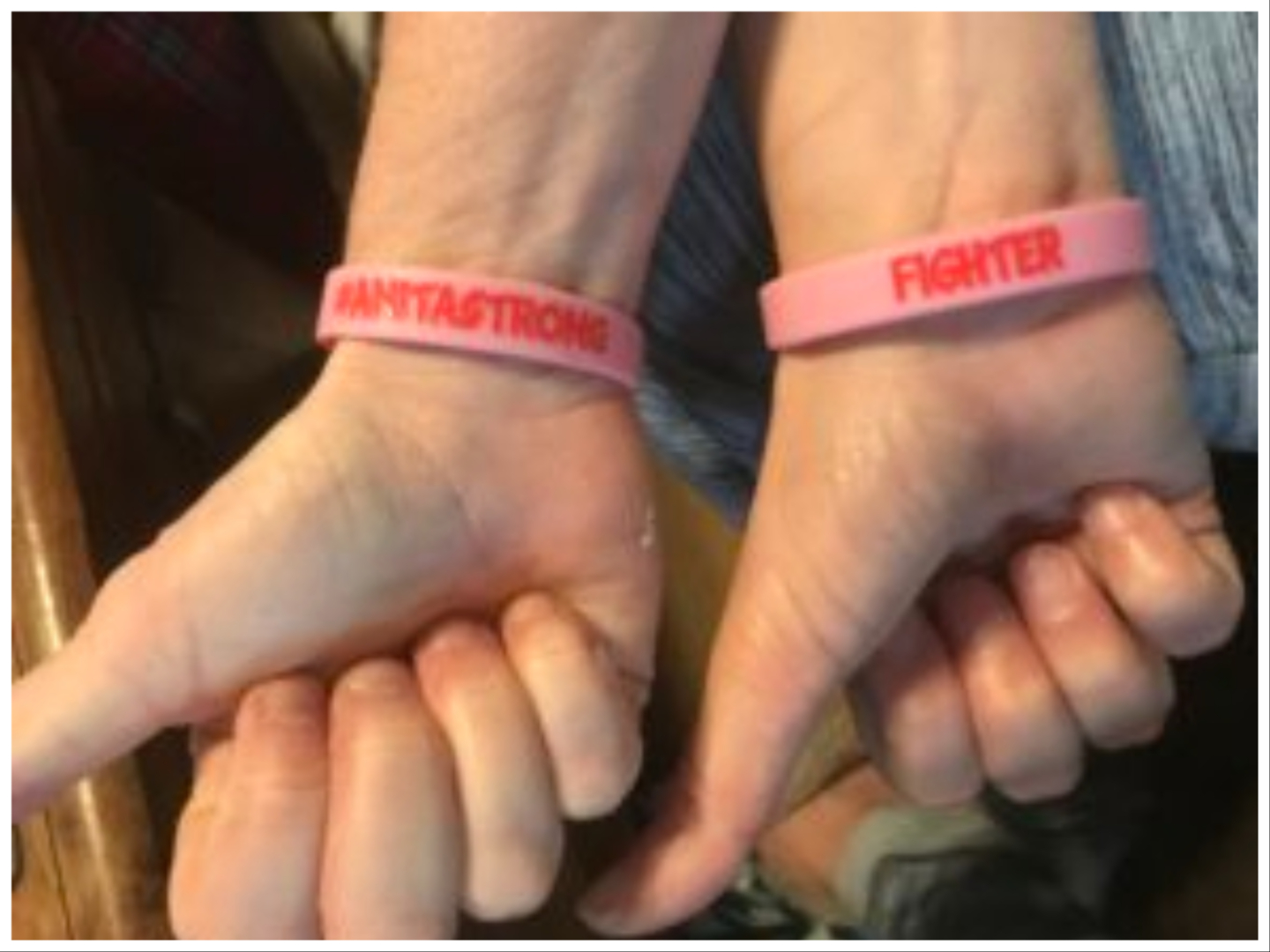What to Know about Breast Cancer
- Singer, Anita Cochran, 56, appears to be making a comeback five years after releasing her iconic anthem “Fight Like a Girl,” inspired by her breast cancer battle.
- Cochran was diagnosed in August 2017 with stage 2 invasive ductal carcinoma, which is cancer that begins in the lining of the milk ducts.
- Cochran underwent chemotherapy and a double mastectomy surgery which is the removal of both breasts.
- Excluding skin cancers, breast cancer is the second-most common cancer in American women
- Cochran’s cancer was triple positive, meaning tumor cells have estrogen receptors (ER), progesterone receptors (PR), and the human epidermal growth factor receptor 2 (HER2), according to the American Cancer Society.
- This type of cancer is typically treated with hormone therapy and drugs that target HER2.
Five years since country singer Anita Cochran, 56, inspired survivors everywhere with the anthem “Fight Like a Girl” after her battle with breast cancer, it appears she may finally be releasing new music, according to a new photo she shared from the music studio.
Cochran’s music career skyrocketed in the late 1990s and her hit single, "What If I Said," topped Billboard's music charts. The award-winning singer-songwriter and record producer recently shared a photo on her Instagram page alongside fellow singer Wendy Moten, suggesting she has something new in the works.
Read MoreView this post on Instagram
While not revealing exactly what she has up her sleeve, Cochran dropped hints that more music may be on the horizon.
"I love you all so much! What an incredible day!!!! I'm just going to say.. #event of the year! Or for me…event of a lifetime…Something awesome just happened. Coming soon!"
While we still don't know all the details of Cochran's upcoming music projects, she revealed she will be part of an upcoming show in Huntsville, Alabama, on April 25 honoring the late country music icon George Glenn Jones.
"So honored to be included on this amazing show for one of my biggest hero's George Jones this line up is amazing," she said in an Instagram post.
It’s been five years since we last heard new music from Cochran. She released “Fight Like a Girl” in 2018, a song that was inspired by her brave battle with breast cancer. The track became an anthem of survivorship for other people battling cancer and health challenges.
Cochran's Breast Cancer Journey
Cochran was diagnosed with stage 2 invasive ductal carcinoma breast cancer in August 2017. She found a lump in her right breast and scheduled an appointment with her doctor for a mammogram and a biopsy.
"The nurse asked, are you alone?…The next words out of her mouth were, 'I'm sorry…and then…you have breast cancer" Cochran said.
After discovering the cancer, she readied herself for chemotherapy. And loved ones who experienced it before helped her cope.
"A friend of mine who just went through breast cancer advised me to chew on ice or a popsicle the entire time I received the chemo to prevent mouth sores which are a huge side effect of chemo," Cochran said.
According to the artist's website, she stepped away from her music career to focus on her health. The cancer warrior documented her journey in a blog and shared her ups and downs while undergoing chemotherapy.
"Food and liquids have started to taste bad. Everything seems to have a very strong metallic taste and water seemed to exacerbate the problem," Cochran described while feeling the side effects of her chemotherapy.
Two months into chemo, Cochran experienced something during her treatment that many cancer warriors battling breast cancer vividly remember.
"I noticed today that my hair was starting to fall out…What it told me was, "If it's making my hair fall out it must be killing the cancer cells! Trying to stay positive," Cochran said.
People going through cancer treatment should know there are ways to help manage the side effects of chemo. There are anti-nausea drugs, scalp cooling techniques for hair loss, and ways to manage anemia (low red blood count) to help combat fatigue.
While not always easy, maintaining a positive attitude is very helpful while battling any kind of cancer. To help keep Cochran motivated, she said her friends made bracelets that say, "Anita Strong".

Five months after beginning her cancer journey, Cochran received some good news: her chemo treatments were working.
"Well, the chemo did its job and has shrunk the tumor to almost nothing! I don't really see the tumor and it seems I can only see the marker we placed by that original tumor. The lymph nodes seem to look good as well". I lay there with tears rolling down my face. I wanted to scream with happiness!" Cochran said.
Cochran weighed her options on either pursuing surgery or radiation treatment to further minimize the chances of the cancer recurring.
Roughly six months after her diagnosis, in February 2018, Cochran underwent double mastectomy surgery, which is the removal of both breasts. For the remainder of the year, Cochran continued her regular check-ups and recovered from surgery.
Anita Cochran Fights Like a Girl
Cochran’s song "Fight Like a Girl" carried a message of strength and determination in the face of a challenge. Her willingness to appear in the music video with her balding hair inspired so many fans.

Cochran said, "The words are inspiring not just to those battling cancer, but to men and women alike who are facing their own personal trials."
"Because I'm a fighter, I'm a survivor, you ain't gonna change my world," Cochran sings in the song.
"My story is about my battle with breast cancer, but there are so many people out there who are trying to push past barriers and that's what this song is about. Everyone is battling something. It's for all of us. I hope it can help give strength and encouragement," she said.
A little over a year after she was diagnosed, Cochran performed her hit song on ABC's "Good Morning America" alongside fellow breast cancer survivor Robin Roberts to promote breast cancer awareness.
Understanding Breast Cancer
Excluding skin cancers, breast cancer is the second-most common cancer in American women.
Anita Cochran said her breast cancer was triple-positive, which means the tumor cells have estrogen receptors (ER), progesterone receptors (PR), and the human epidermal growth factor receptor 2 (HER2), according to the American Cancer Society.
This kind of cancer is typically treated with hormone therapy and drugs that target HER2.
More breast cancer warriors
- ‘A Wasp Saved My Life!’ Mom, 46, Diagnosed With Breast Cancer After Seeing Doctor About Wasp Sting
- ‘AGT: Extreme’ Honors Nightbirde, Beloved Contestant Who Bravely Fought Breast Cancer
- ‘Anne With An E’ Star Miranda McKeon, 19, Fears Losing Her Support System After Beating Breast Cancer
- ‘Even with Cancer in My Life, I am a Lucky Person’: Breast Cancer Fighter Shannen Doherty Focuses on the Positive, Thanks God
According to SurvivorNet's medical experts, you're more likely to develop breast cancer if you have one or more of these risk factors:
- You're older: Your risk for this cancer rises, the older you get. That doesn't mean that you're destined to get breast cancer as you age, or that young people are immune to it. You just need to be more vigilant about screenings as you get older.
- You have a gene mutation: Some women inherit changes to genes like BRCA1 or BRCA2, that increase their risk for breast cancer. Genetic tests can find these changes early, acting as an early warning for women to take preventive steps.
- You were exposed to estrogen for longer: Estrogen is a hormone that helps some breast cancers grow. Getting your period early (before age 12) or starting menopause late (after age 55), increases your exposure to this hormone.
- You waited to have children: Your risk may be higher if you waited to have children until after age 30, or you never gave birth. The risk is only slightly higher, meaning that you're definitely not going to get breast cancer, just because you waited to have children.
- You were exposed to radiation: Being exposed to radiation early in life; for example, during treatment for a cancer like Hodgkin's lymphoma, can increase your risk of breast cancer later in life.
- You have a family or personal history of breast cancer: Having cancer in your family, or going through treatment yourself, can make you more likely to be diagnosed.
WATCH: Understanding Stage 2 Breast Cancer.
Medical experts say breast cancer symptoms can present in a few different ways. New lumps in the breast or underarm are common symptoms of breast cancer. Swelling, skin dimpling or peeling of the breasts are other visual cues women should be looking out for when checking for signs of breast cancer.
A mammogram is the primary test doctors use to screen for breast cancer.
If you notice any changes in your breasts, such as new lumps or nipple changes, ask your doctor about getting a mammogram or other screening tests. Remember that you're the best expert on your own health and what's normal, or not, for your body. SurvivorNet's experts recommend that you do regular breast self-exams.
Learn more about SurvivorNet's rigorous medical review process.

